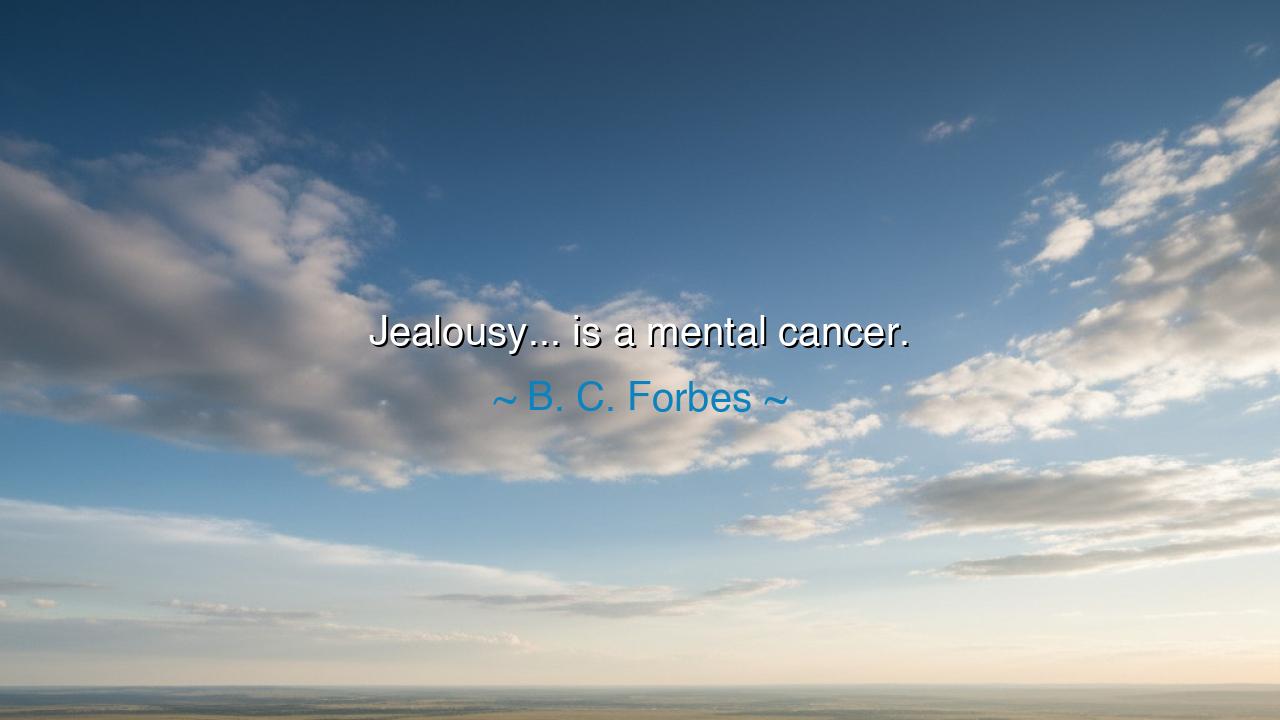
Jealousy... is a mental cancer.






There are maladies of the soul more insidious than any disease of the flesh, and among them is jealousy, which the astute observer B. C. Forbes once called: “a mental cancer.” In these words lies a warning as dire as any physician could give—a caution that jealousy, unlike physical illness, devours quietly from within, spreading through the mind and heart until it leaves no peace, no clarity, no joy. Forbes, a sage of business and human nature, understood that envy is not merely a fleeting feeling, but a corrosive force that gnaws at the foundations of reason, friendship, and self-respect. Like a cancer, it begins small, unseen, and if allowed to fester, can consume an entire life from within.
To comprehend the depth of Forbes’s metaphor, one must grasp the nature of jealousy. It is not merely coveting another’s success; it is a pervasive fixation on the perceived superiority of others, coupled with the fear that we ourselves are less. It poisons thought, erodes contentment, and breeds resentment toward those we might otherwise admire. Like a malignant growth, jealousy spreads, distorting our perception of reality. Every word, every action of the envied is magnified, interpreted as slight or threat, until the mind itself becomes a battleground of suspicion and bitterness. Forbes, in calling it a “mental cancer,” reveals both the danger and the inevitability: if unchecked, jealousy devours the spirit as surely as any disease consumes the body.
The origin of this insight lies not only in Forbes’s study of commerce and human ambition, but in his observation of life itself. As a writer on business and character, he witnessed how envy in men of talent or power could destroy partnerships, friendships, and even entire enterprises. He saw that a man obsessed with another’s achievements is rarely motivated to improve himself; rather, he is consumed by fear, anger, and endless comparison. In these cases, jealousy does not merely harm relationships—it harms the self. It spreads through the psyche, leaving only bitterness where ambition and joy might have flourished.
History, too, offers ample evidence of Forbes’s truth. Consider King Saul, whose envy of David’s rising favor and prowess destroyed his peace and ultimately his kingdom. Saul’s jealousy was subtle at first, a shadow in his heart, but it grew unchecked. Every praise David received, every victory, every act of honor, became a fresh wound to Saul’s mind. He plotted, he raged, he alienated friends, and he ultimately brought ruin upon himself. Thus, jealousy, like a cancer, did not harm David—it harmed Saul, devouring his reason, his contentment, and his legacy.
Even in the modern world, Forbes’s metaphor remains vivid. In workplaces and families, envy creeps silently, undermining trust and breeding suspicion. The talented colleague whose success irritates rather than inspires may never reach his full potential, for the mental cancer has warped his perception. The parent who envies another’s child’s achievements may fail to nurture the gifts of their own. Forbes’s observation reminds us that the harm of jealousy is rarely external; it attacks first and foremost the very soul that harbors it.
Yet there is hope in recognition. Just as cancer can sometimes be treated when detected early, jealousy can be mitigated when acknowledged. Forbes’s warning is also a prescription: identify envy for what it is, confront it, and replace it with admiration, inspiration, or self-reflection. The envious heart must shift from comparison to cultivation—from resentment to aspiration. By turning the corrosive energy of jealousy toward self-improvement, one can transform the cancer into fuel for growth, rather than allowing it to rot from within.
The lesson, then, is both stark and liberating: jealousy is a mental cancer, but one that can be treated through vigilance and self-mastery. Guard your thoughts against comparison, cultivate gratitude for your own life, and seek inspiration in the success of others rather than rivalry. Recognize envy as poison and excise it through reflection, empathy, and action. For a life consumed by jealousy is a life half-lived, while a life liberated from envy becomes radiant, purposeful, and resilient.
So let B. C. Forbes’s words echo through the corridors of time: “Jealousy... is a mental cancer.” Protect your mind, nurture your heart, and let admiration replace envy. Let the accomplishments of others illuminate what is possible, rather than wound what is already yours. By understanding the disease, one can guard against it, heal from it, and grow stronger—living not in the shadow of another’s light, but in the fullness of one’s own.






AAdministratorAdministrator
Welcome, honored guests. Please leave a comment, we will respond soon